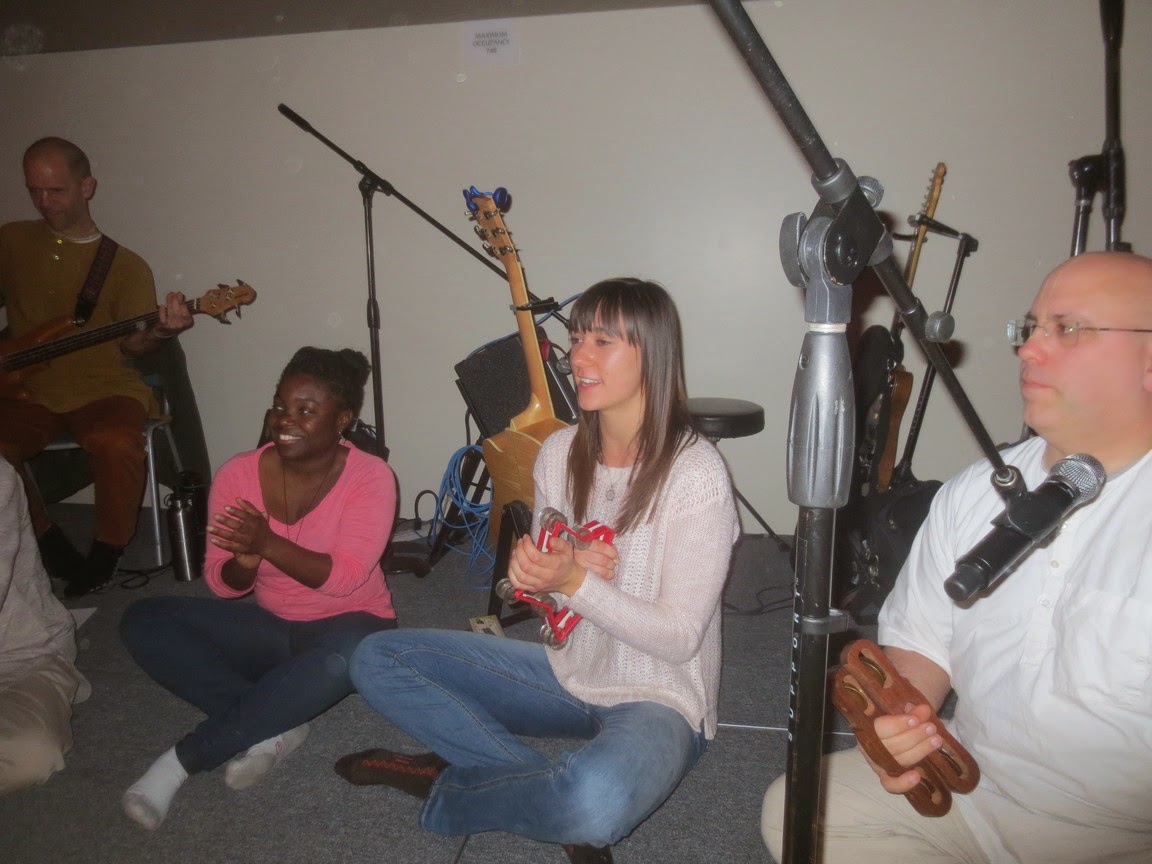Lecture Podcast:
Download by "right-click and save content"
Don’t be so concerned about others’ future destination as to be cut off from their present emotion
A Most Sacred Place
→ travelingmonk.com
Gauranga Shata Nama 7 – The follower of dharma becomes the relisher of the para dharma
→ The Spiritual Scientist
Holy Name Meditation Podcast:
Download by "right-click and save content"
HG Prema Caru Prabhu / SB 10.79.27-29
→ Kalachandji's Audio Archive
My teacher called death
→ Servant of the Servant
Why must we feel pain only during death or just before death? Why do we have to feel pain only if my loved ones die? When we see others depart, is it not a lesson God is teaching us to prepare for our own ultimate and untimely death? If we prepare nicely, there may be physical pain but not emotional and mental pain when our time comes. But despite so many fore warnings we hear all around us through media, scriptures and Guru...still practically everyone is thinking I will deal with it when my turn comes and in their free time desperately try to squeeze happiness either through family, friends, community, entertainment etc
So only when we feel the pain for beings around us when they are dying will we snap out of our illusion of enjoyment. Of course I am not suggesting going to depression as there is misery practically everywhere, however, this sort of mature empathy towards the suffering of other beings will make us sober, will make us realize how insignificant our attempts to enjoy are and that our only purpose, hope and optimism out of this misery is to take shelter of the Supreme Being Krishna.
As long as we continue to deny this truth omnipresent death, be blind to this truth, divert away from this truth by engaging in other activities, we cannot be happy in this world. Sobering up and finding a way to take shelter of Krishna is the only way we can be truly happy in this world!
Hare Krishna
Mayapur Kirtan Mela 2015 (Album 101 photos)
Here are some shots…
→ Dandavats.com

Mayapur Kirtan Mela 2015 (Album 101 photos)
Here are some shots of the devotees chanting for Sri Panca Tattva’s pleasure. Nitai Gaura Premanande!
See them here: http://goo.gl/G2Btaq
Navadwip Mandal parikrama Day 1
→ Mayapur.com
After kirtan mela, Navadwip Mandal parikrama began. Parikrama Adivas took place on 21st morning at Yog pitha. The parikrama began on 22nd and it would conclude on 28th February. The images of the event are being uploaded regularly on the facebook page of Parikrama: https://www.facebook.com/NavadvipaMandalaParikrama. Day 1: On the first day of parikrama, devotees […]
The post Navadwip Mandal parikrama Day 1 appeared first on Mayapur.com.
Devotees perform Harinama for disabled children in their…
→ Dandavats.com

Devotees perform Harinama for disabled children in their hospital (5 min video)
Hare Krishna Dear Devotees. please accept my humble obeisances, All glories to Srila Prabhupada.
I would like to share with you this nice video, of our preaching program in Chile.
Please give us your blessings to keep going on.
your servant
Sri Bhakti Das.
Watch it here: http://goo.gl/A1nvfC
Panca tattva cry during Kirtan mela
→ Mayapur.com
On the concluding night of Kirtan Mela this year (February 20th 2015), devotees in Mayapur bore witness to something truly unforgettable: the Panca Tattva deities shedding profuse tears. The next day we asked His Grace Jananivas Prabhu, head pujari of Sri Sri Mayapur Candradoya Mandir, to comment on the significance of this event. Here’s what […]
The post Panca tattva cry during Kirtan mela appeared first on Mayapur.com.
A young Krishna conscious artist (2 min video)
Watch it here:…
→ Dandavats.com
Initiation Ceremony at Kalachandji’s Hare Krishna Temple…
→ Dandavats.com

Initiation Ceremony at Kalachandji’s Hare Krishna Temple in Dallas (Album 34 photos)
See them here: http://goo.gl/dc2oPA
Mothers’ day festival, Sunday 22nd – Candramauli, B. Purusottama and Smita Krsna Swamis speak
→ SivaramaSwami.com
The post Mothers’ day festival, Sunday 22nd – Candramauli, B. Purusottama and Smita Krsna Swamis speak appeared first on SivaramaSwami.com.
The role of mothers can only be complete in a Varnasrama structured society
→ SivaramaSwami.com
Mothers’ day festival, Sunday 22nd – Sivarama Swami.
The post The role of mothers can only be complete in a Varnasrama structured society appeared first on SivaramaSwami.com.
Navadwip Mandal Parikrama 2nd day In Godrumadvip (Album 5…
→ Dandavats.com

Navadwip Mandal Parikrama 2nd day In Godrumadvip (Album 5 photos)
See them here: http://goo.gl/ZzVJPg
First day of Nabadwip Mandal parikrama and we are in Harihar…
→ Dandavats.com
Deity worship courses at Mayapur Academy
→ Mayapur.com
Mayapur Academy Gaura Purnima courses The Mayapur Academy offers the following courses on deity worship for the devotees. Questions and answers on deity worship (HG Jananivas Prabhu) with Russian translation. 1 March, 10.30 am – 1.30 pm Cooking (HG Rasesvari Mataji) with Russian translation. 1 – 3rd March, 10 am – 2 pm […]
The post Deity worship courses at Mayapur Academy appeared first on Mayapur.com.
Pandal programs during Gaura Purnima
→ Mayapur.com
This year the Gaura Purnima Festival, Main Pandal Entertainment will be held on February 28, March 1, 2, 3 & 4. The Main Pandal is located near Vamsi Bhavan. There are a number of great acts already booked to perform this year including a new production by Bhakti Marg Swami. Maharaja’s new drama, “Blue Mystic” […]
The post Pandal programs during Gaura Purnima appeared first on Mayapur.com.
Hare Krishna! Should we hate the mind?
Admittedly, the problem…
→ Dandavats.com

Hare Krishna! Should we hate the mind?
Admittedly, the problem of hating the mind is far less common than the problem of believing it naively. But just as dualities characterize almost everything in the material world – heat-cold, pleasure-pain, honor-dishonor – so too can they characterize our attitude towards our mind. We can oscillate from attachment that manifests as unhealthy trust in the mind to aversion that manifests as unhealthy loathing of the mind. However, such loathing is unscriptural and unworkable.
Read the entire article here: http://www.dandavats.com/?p=15732
Scenes from Mayapura on the first day of Gurukula Parikrama
→ SivaramaSwami.com
The post Scenes from Mayapura on the first day of Gurukula Parikrama appeared first on SivaramaSwami.com.
Should we hate the mind?
→ The Spiritual Scientist
Answer Summary: No; we need to treat the mind as a horse to be trained, not as an enemy to be hated.
Answer: In our daily life, we are often misled by the mind. Under its spell, we do things that we regret later. When its schemes get us into trouble repeatedly, we may start hating it, as if it were an incorrigible enemy.
Unscriptural and unworkable
Admittedly, the problem of hating the mind is far less common than the problem of believing it naively. But just as dualities characterize almost everything in the material world – heat-cold, pleasure-pain, honor-dishonor – so too can they characterize our attitude towards our mind. We can oscillate from attachment that manifests as unhealthy trust in the mind to aversion that manifests as unhealthy loathing of the mind. However, such loathing is unscriptural and unworkable.
Unscriptural: Scripture does often call the mind an enemy. But it also calls it a friend, with both addresses sometimes occurring in the same verse, as in the Bhagavad-gita (06.05). Acknowledging that the mind can be our friend as well as our enemy, the verse urges us to elevate, not degrade, ourselves with it. Evidently, this verse doesn’t convict the mind as an enemy; instead, it asks us to deal with it carefully, by staying aware of its binary potential for amiability and hostility. And this is the overall scriptural attitude towards the mind – handle with caution.
Unworkable: Hatred for the mind is unworkable because we need the mind. Whatever we do, we do it with the mind and through the mind – the mind is the central and indispensable link between us souls and our physical bodies. No matter how much we hate the mind, we can’t get rid of it.
Whatever we do, we do it with the mind and through the mind – the mind is the central and indispensable link between us souls and our physical bodies.
Suppose a woodcutter hates his axe for whatever reason, maybe because it is blunt. But if he has no other axe and has no chance of getting one, his hatred of that axe does nothing except waste his time and thought. After all his hand-wringing, fist-shaking and foot-stamping, he will have to pick up that very axe and use it. Similarly, no matter how much we hate the mind, eventually we have to work with it – we can never get another mind. Our hatred of it does nothing except waste our time and thought.
Not hating the mind doesn’t at all imply that we naively embrace it, for that will open us to becoming disastrously deluded by it; it implies only that we can’t adopt with the mind any of the standard strategies adopted with an hated enemy: incarceration, expulsion or execution. We have to live and work lifelong with the mind. So, we certainly need to be on our guard while dealing with it.
Watchful-not-hateful
The best attitude for dealing with the mind can be phrased as watchful-not-hateful. We can see such an attitude at work in the breaking of a horse. In this usage, breaking refers not to physically breaking the bones of a horse, but to emotionally breaking it, that is, breaking its obstinacy so that it learns to obey its human masters. An unbroken horse, be it a wild horse recently captured or a young horse unacquainted with human beings, is hardly ever ready to be ridden. If someone somehow manages to climb on it, it often tries to toss off, even trample, its rider.
The uncontrolled mind is like an unbroken horse. The Gita (06.34) states that the mind is restless (chanchala), inebriated (pramathi), powerful (balavad) and obstinate (drudham) – a fearsome combination indeed. The mind is not at all ready to assist us in executing our plans. To the contrary, it resists our plans, akin to a horse that refuses to be ridden. Worse still, it sometimes impels us to act out its shortsighted schemes for instant gratification, schemes that often trample the values we hold sacred.
To break a wild horse, expert horse trainers adopt a patient and persistent regimen of reward and punishment. Put simply, this regimen centers on giving the horse food and affection when it acts cooperatively, and giving it starvation and discipline when it acts recalcitrantly. When subject to such a regimen, the horse slowly but surely comes around till it becomes an aide of the rider.
Detachment too can be said to have two aspects: not getting attached to the mind’s schemes when it proposes them; and not being attached to the expectation of an immediate change in the mind, but being willing to work with its present capacity while striving for gradual improvements in that capacity.
For dealing with the mind, the Gita (06.35) recommends that we adopt a similar regimen of practice and detachment. Practice centers on fostering good thoughts in the mind and detachment centers on distancing ourselves from its spells of bad thoughts. The practice for training the mind can be said to have two aspects – practice in fixing it on positive things and practice in dragging it back whenever it wanders off to negative things. And detachment too can be said to have two aspects: not getting attached to the mind’s schemes when it proposes them; and not being attached to the expectation of an immediate change in the mind, but being willing to work with its present capacity while striving for gradual improvements in that capacity.
A power greater than the mind’s
Often horse-shoppers buy a horse that has already been broken or pay some horse expert to break it for them. Unfortunately, we don’t have that luxury with regards to our mind. No one else can train it for us. No doubt, we need the guidance of an expert spiritual master – without it, we would have little, if any, hope of success in training the mind. But even with the spiritual master’s guidance, the onus for training it is on us.
Thankfully though, we have, by the spiritual master’s mercy, access to a power far greater than that of the mind – the supreme power of God, Krishna. The Gita (06.47) declares that the topmost yogis fix their mind on Krishna. Some easy ways to fix our mind on him are chanting his holy names, studying his message, worshiping his Deity, praying to him and sharing his message with others. By thus engaging sincerely in his devotional service, we attract his mercy. That mercy gives us the intelligence and the willpower necessary for training the mind and thereby leading a principled, purposeful life. No wonder the Gita repeatedly (02.61, 07.14, 08.07, 09.34, 10.09, 18.58, 18.65) urges us to fix our mind on Krishna.
An untrained horse can endanger its rider, but the same horse when trained can rescue the rider from danger. During wartime, well-trained horses have been known to carry wounded riders to safety. Similarly, the untrained mind is a danger for us, but when trained it can protect us from danger. If by training it in bhakti-yoga we can make our mind attached to Krishna, as the Gita (07.01) urges, then whenever we encounter dangerous temptations, our mind will prompt us to flee from there, and seek shelter and pleasure in Krishna. Thus, we will realize the Gita’s assertion (06.06) that the mind can be our friend.
When we work according to our material abilities, our mind often gives us good ideas for tapping those abilities more effectively and thus improving our performance.
Even now, we can glimpse the mind’s potential for friendship. When we work according to our material abilities, our mind often gives us good ideas for tapping those abilities more effectively and thus improving our performance. And whatever aspects of devotional service we feel attracted to, the mind often prompts us to do those activities more and better. By fanning such constructive tendencies of the mind, we can mold it into our friend. And by recollecting these occasional occasions, we can avoid slipping into hatred of the mind when it reverts to its presently default mode of distracting us.
Thus, by being aware of both the mind’s present hostility and its potential for amicability, we can train it with the balanced attitude of being watchful-not-hateful.
His Holiness Devamrta Swami Speaks About the TOVP
- TOVP.org
His Holiness Devamrita Swami speaks about how you can contribute to this magnificent project, and be a part of something that will continue for ages to come.
The post His Holiness Devamrta Swami Speaks About the TOVP appeared first on Temple of the Vedic Planetarium.
His Grace Praghosa Das Speaks About the TOVP
- TOVP.org
Praghosa prabhu, the newly appointed GBC Chairman, speaks on the Disappearance Day of Srila Bhaktivinoda Thakur about the Thakura’s predictions and how “impossible” is not a word in a Vaishnava’s dictionary.
The post His Grace Praghosa Das Speaks About the TOVP appeared first on Temple of the Vedic Planetarium.
His Holiness Bhakti Vaibhava Swami Speaks About the TOVP
- TOVP.org
Bhakti Vaibhava Maharaja talks about Srila Prabhupada’s vision about the scientific basis of Krishna consciousness and that once we are able to explain this properly, people from all over the world will come to Mayapur. And Mayapur would become a huge city with its own airport, etc. Srila Prabhupada has simply revived and expanded on the original vision of our predecessor acharyas.
The post His Holiness Bhakti Vaibhava Swami Speaks About the TOVP appeared first on Temple of the Vedic Planetarium.
His Holiness Bhakti Prabhupada-vrata Damodar Swami Speaks About the TOVP
- TOVP.org
Maharaja has been observing the progress in the construction of the TOVP over the last three years with great pleasure. It’s not surprising that, with the influence of Srila Prabhupada’s spiritual potency, this great temple is being built. No one wants to come hear a sadhu speak under a tree. Therefore, Srila Prabhupada wanted to create this impressive structure to attract people to come hear about Krishna and to get ISKCON on the “world map”, as well as inspire the worldwide devotee community.
The post His Holiness Bhakti Prabhupada-vrata Damodar Swami Speaks About the TOVP appeared first on Temple of the Vedic Planetarium.
February 23rd, 2015 – Darshan
→ Mayapur.com
The post February 23rd, 2015 – Darshan appeared first on Mayapur.com.
Hare Krishna! From Sri Mayapur Chandrodaya Mandir: HH…
→ Dandavats.com

Hare Krishna! From Sri Mayapur Chandrodaya Mandir: HH Prahladananda Swami
Srila Prabhupada once wrote to me. He said, “The boys and girls in your country are generally good souls. That’s why they have taken birth in such a nice country. So now let them utilize everything in Krishna’s service. That will make their life perfect. As Krishna sees that you are working seriously to help bring His other children back to the spiritual kingdom, then He will bestow all of His blessings upon you. Krishna is never ungrateful for our efforts to serve Him. Rest assured.”
Read the entire article here: http://www.dandavats.com/?p=15728
HH Badrinarayana Goswami at ISKCON Mayapur on 2015-02-13
→ Gouranga TV - The Hare Krishna video collection
HH Badrinarayana Goswami at ISKCON Mayapur on 2015-02-13, Srimad Bhagavatam Canto 06 04 10 11
HG Chaitanya Chandra Prabhu / Bg 1.21-22 – Sunday Feast
→ Kalachandji's Audio Archive
Discusion in Srila Prabhupada’s House, February 22, Vrindavan
Giriraj Swami
 Devotee: Because we have times when we are strong and times when we we are weak we should make arrangements in our lives so that we are protected against our tendencies to become weak.
Devotee: Because we have times when we are strong and times when we we are weak we should make arrangements in our lives so that we are protected against our tendencies to become weak.
Giriraj Swami: Very practical. Once, Jayadvaita Swami and I were speaking to the temple president in Spain at night and he said we should wake him up at 4 o’clock the next morning. Then he said. ‘If I don’t get up you should nudge me. If I still don’t get up you should pour water in my face (laughter). And, whatever I say in the morning, don’t listen to that but listen to what I am telling you now (laughter).’ That is definitely an example of putting yourself in a situation that helps to overcome your weaknesses.
The Devotee Always Prays
→ Japa Group
From Cc. Madhya 22.16 purport
Beauty
→ The Enquirer
“Beauty is the summary of all good qualities.”
- Śrīmad Bhāgavatam 4.1.52
[mūrtiḥ sarva-guṇotpattiḥ]
Tagged: Beauty, Srimad Bhagavatam, Virtue
grounded and innovative
→ Servant of the Servant
However, an advanced devotee will know where to draw the line between one's own creative thinking and Hand of God. An advanced devotee will never lose sight of the fact that man proposes but ultimately God disposes and in that disposition remains humble, patient and enthusiastic. So while we need creative thinking to execute our ideas, we should realize in a deeper way that ultimately it is Krishna who sanctions our creativity. This thought can always keep us grounded but at the same time innovative. In this mental state, we will not take failure too personal and success will not spoil us.
Hare Krishna
Travel Journal#11.3: Jacksonville, Tallahassee, Gainesville, and Alachua
→ Travel Adventures of a Krishna Monk
By Krishna-kripa das
(February 2015, part one)
(Sent from Gainesville, Florida, on February 22, 2015)
(4) Jahnavi-jivita-patih: the husband enthusing Jahnavi with life
 |
because His name is connected to the name of Radha.
Sri Radha is famous in the world
because Her name is connected to the name of Lord Madhava.
is not different from the substance musk,
just as moonlight is not different from the moon, and just as the
beautiful blossoms of a tree are
not different from the tree,
in the same way Sri Radha is not different from Lord Krishna.”
delightful experience. At first
a devotee may be reluctant,
thinking he is tired or
he or she may be afraid they
will be mocked by the public.
But once they get out there
and sing with the group,
the spiritual energy
takes over. The pleasure-
giving potency infuses one with
bliss, and Krishna gives courage
to endure any unfriendly
reception from the nondevotees.
The more regularly one goes
out one gains confidence
and wants to do it every day.”
Gita 05.20 – Equanimity is meant to make us not emotionless, but purposeful
→ The Spiritual Scientist
Gita Verse-by-verse Study Podcast
Download by "right-click and save content"
CC daily 24 – M 87-90 – The essence of initiation is not the ritual but the commitment to serve
→ The Spiritual Scientist
CC-daily Podcast:
Bhagavatam-daily 129 – 11.09.01 – Posssessiveness produces pain
→ The Spiritual Scientist
Bhagavatam-daily Podcast
Hare Krishna! Humble and Feeling Good
In a famous story from the…
→ Dandavats.com

Hare Krishna! Humble and Feeling Good
In a famous story from the Mahabharata, Krishna once met with Yudhishthira Maharaja and Duryodhana. Desiring to glorify His devotee Yudhishthira, Krishna requested him to find a person lower than himself, and asked sinful Duryodhana to find a person greater than himself. Yudhishthira had all good qualities. He was peaceful and self-satisfied. No doubt he had healthy self-esteem. Yet he could not find anyone he considered lower than himself. Again, this is the example of an advanced Vaishnava who embodies genuine humility.
Read the entire article here: http://www.dandavats.com/?p=15724
Gauranga Shata Nama 6 – Let him take away our pride or he will
→ The Spiritual Scientist
Holy Name Meditation Podcast
HG Sridhar Shyam Prabhu / CC Madhya 8 -Talks Between Śrī Caitanya Mahāprabhu and Rāmānanda Rāya
→ Kalachandji's Audio Archive
England, January 2015: Recordings
→ KKSBlog
 Please find below, recordings from Kadamba Kanana Swami’s visit to England (10-19 January). Courtesy of Bhakta Shiv.
Please find below, recordings from Kadamba Kanana Swami’s visit to England (10-19 January). Courtesy of Bhakta Shiv.
To listen online, press the play button. To download, right-click on a title and ‘save target as’.
Audio
KKS_UK_Manor_10 January 2015_Kirtan Fiesta
KKS_UK_Manor_14 January 2015_SB 9.10.16
KKS_UK_Leicester_11 January 2015_Initiation Kirtan
KKS_UK_Leicester_11 January 2015_Initiation Lecture
KKS_UK_Manor_13 January 2015_Living_with_conflicts_and_opinions_Part 1
KKS_UK_Manor_13 January 2015_Living_with_conflicts_and_opinions_Part 2
KKS_UK_Soho_15 January 2015_SB 10.77.33-37
KKS_UK_Soho_15 January 2015_Lunch Class_BG 2.67
KKS_UK_Soho_15 January 2015_Lunch Class_QandA
KKS_UK_Soho_15 January 2015_Evening Class_BG 15.17
KKS_UK_Soho_15 January 2015_Evening Kirtans
KKS_UK_Manor_16 January 2015_SB 9.10.21-22
KKS_UK_Matchless Gifts_16 January 2015_Evening Kirtan
KKS_UK_Matchless Gifts_16 January 2015_Evening Lecture
KKS_UK_Manor_19 January 2015_SB 9.10.23
KKS_UK_Manor_19 January 2015_Brahmacari Class







































